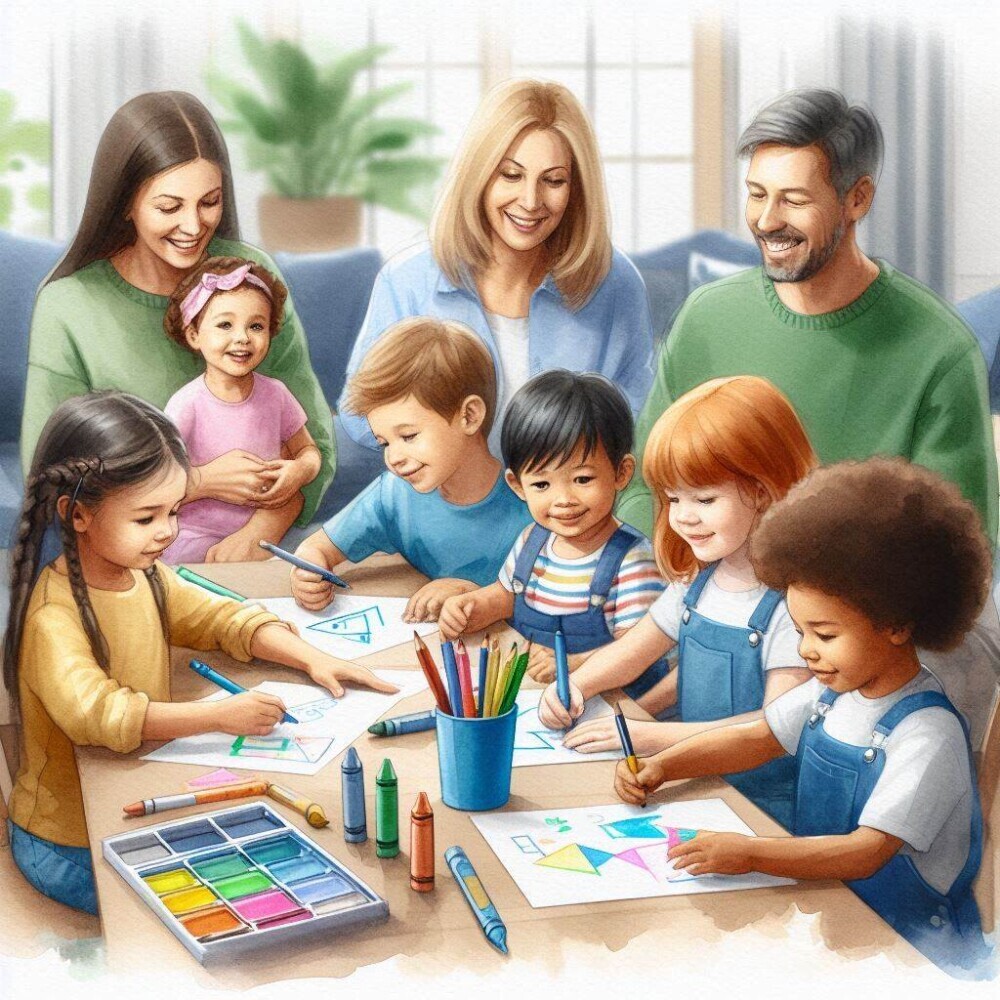Introduction
Homeschooling for kindergarten is a wonderful opportunity to create a personalized learning environment that aligns with your child’s unique needs, interests, and pace. When it comes to homeschool curriculums for kindergarten, there is no one-size-fits-all approach. With so many options available, it’s important to take time to research and understand what will work best for your child’s development and your family’s lifestyle.
Choosing the right curriculum can be a bit overwhelming, especially with the variety of subjects and teaching styles available. From online programs to hands-on learning, there are endless possibilities to explore. However, the beauty of homeschooling is that you have the flexibility to adapt and make adjustments as needed, ensuring your kindergartener stays engaged and excited about learning.
In this guide, we will explore the key benefits of homeschooling, important considerations when selecting a curriculum, and a list of top recommendations to help you create a fun, engaging, and effective educational experience. With the right approach and the best homeschool curriculum, you’ll be able to lay a strong foundation for your child’s academic journey.
This post may contain affiliate links. When you click and purchase from any of our links, we may get a small commission at no extra cost to you. For more information, please see our affiliate disclosure.
Introduction to Homeschooling for Kindergarten
Homeschooling in the early years of education provides children with a nurturing environment where learning can be seamlessly integrated into daily life. Kindergarten, in particular, is a time of exploration, curiosity, and foundational skill-building.
Benefits of Homeschooling for Kindergarten-Aged Children
Homeschooling at this stage offers flexibility, allowing children to learn at their own pace and through activities that appeal to their interests. This approach can foster a love of learning early on, help develop strong parent-child bonds and provide an educational experience free from the pressures often found in traditional school settings.
Addressing Common Concerns About Home Education at This Stage
Parents might worry about their ability to teach, socialization, and whether homeschooling will set their child up for future success. Rest assured that a well-chosen curriculum can support these goals and address these concerns by incorporating interactive, social, and skill-building activities.
Setting Homeschooling Goals for Your Kindergartener
Define what you hope your child will achieve through homeschooling, such as mastering early literacy and math skills, developing fine and gross motor skills, and nurturing creativity and problem-solving abilities. Clear goals can help guide curriculum choices and keep you focused on your child’s progress.
Criteria for Choosing the Best Kindergarten Curriculum
Choosing the right curriculum involves considering several factors to ensure it aligns with your family’s values and your child’s learning needs.
Factors to Consider: Teaching Style, Learning Preferences, Flexibility
Some curricula are structured with clear daily lessons, while others offer a more flexible approach. Consider your teaching style and your child’s learning preferences—whether they respond best to hands-on activities, structured workbooks, or digital learning tools.
Balancing Academic Rigor with Creative Play
Kindergarten is as much about play as it is about academics. A balanced curriculum combines early academic concepts with creative play, ensuring that learning remains enjoyable and age appropriate.
Cultural Relevance and Inclusivity in Curricula
Select a curriculum that reflects diverse perspectives and inclusive content, helping children develop empathy and a broader worldview. Look for programs that represent a range of cultures and encourage acceptance.
Budget Considerations and Affordability
Homeschooling can vary significantly in cost. Look for options that fit your budget, as some curricula offer affordable or even free resources while maintaining quality.
Top 10 Kindergarten Homeschool Curriculums
- ABCmouse – This popular online program is known for its engaging and interactive format, covering math, reading, science, and art through games, songs, and stories. Suitable for a variety of learning styles, ABCmouse is both flexible and affordable.
- The Good and the Beautiful – This curriculum offers a holistic approach that includes phonics, reading, writing, math, and art with a focus on moral and character development. It’s also budget-friendly, with some free resources available online.
- K12’s Embark Comprehensive – A full online curriculum, K12’s Embark Comprehensive includes over 1,200 interactive activities in literacy, math, social studies, and science. It’s ideal for families seeking a technology-focused curriculum with rich multimedia content.
- Oak Meadow – Known for its nature-based, arts-integrated approach, Oak Meadow provides a curriculum that emphasizes creativity, critical thinking, and hands-on learning. It’s especially great for families interested in a Waldorf-inspired approach to education.
- Time4Learning – Time4Learning is an online program offering structured, self-paced lessons in language arts, math, science, and social studies. It’s user-friendly and provides flexibility, allowing parents to monitor progress and customize lessons.
- Explode the Code – This phonics-based program focuses on literacy through simple, engaging workbooks designed to improve reading fluency. It’s an excellent choice for parents who prefer a workbook-based approach and want to focus on early reading skills.
- Torchlight – Torchlight’s curriculum is designed for families who want a secular, literature-based program with a focus on critical thinking and empathy. Torchlight’s kindergarten curriculum includes science, social studies, art, and early literacy.
- Horizon’s Kindergarten Curriculum – A faith-based program, Horizon’s curriculum covers math, phonics, reading, and physical education, emphasizing foundational skills through structured lessons and workbooks.
- Sonlight’s Kindergarten Package – This literature-rich curriculum emphasizes history, geography, and social studies, using engaging books and stories to inspire a love of reading. It’s ideal for families who enjoy storytelling and world exploration.
- Singapore Math – Singapore Math is renowned for its emphasis on problem-solving and visual thinking, using manipulatives and interactive activities to teach math. It’s a great supplement to other curricula and an excellent choice for math-focused families.
Interactive and Engaging Learning Approaches for Kindergarten
At this age, children learn best through active play and exploration, making it essential to incorporate hands-on activities and creative approaches into the curriculum.
Importance of Experiential Learning and Hands-On Activities
Activities like gardening, cooking, and building can all be educational, promoting critical thinking and real-world skills. When children are involved in active learning, they retain information better and stay engaged.
Incorporating Arts and Crafts into the Curriculum
Art is a powerful tool for fostering creativity and developing fine motor skills. Simple crafts, drawing, painting, and even basic music lessons can complement any curriculum, giving children a well-rounded experience.
Utilizing Online Resources and Educational Apps Effectively
Educational apps like ABCmouse, Khan Academy Kids, and Duolingo ABC offer lessons in literacy, math, and science in a way that feels like play. These tools can be great for incorporating variety and interactivity into your homeschooling day.
Creating a Stimulating Learning Environment at Home
Arrange a dedicated learning area with a small table, shelves for books, and supplies for crafts and projects. The goal is to create a space where your child feels excited to learn, surrounded by resources that spark curiosity.
Tips for Successful Implementation of Kindergarten Curriculum
Implementing a kindergarten curriculum is more about setting up a rhythm than sticking to rigid schedules.
Establishing a Flexible and Consistent Routine
Having a routine helps children know what to expect, making it easier to transition between activities. A flexible routine accommodates their attention span and energy levels, allowing you to adapt based on the day’s needs.
Involving Parents in the Learning Process
Parents play a central role in homeschooling, acting as guides, cheerleaders, and teachers. Embrace this involvement as a way to bond with your child, making learning a shared experience.
Regular Assessment and Customizing Learning Paths
Simple assessments can gauge progress, helping you identify areas where your child excels or needs more support. Adjusting lessons as you go keeps the curriculum personalized and responsive to their development.
Building a Community and Support Network for Homeschoolers
Joining a homeschooling group or co-op can provide social opportunities for your child and support for you. Many groups organize field trips, playdates, and other activities that enrich the homeschool experience.
Resources for Further Reading and Professional Support
As you navigate homeschooling, consider consulting homeschooling guides, joining forums, and taking advantage of free online resources to support your journey. Your commitment to your child’s growth and education is invaluable, and the choices you make today will positively impact their future.
Final Thoughts
Choosing the best curriculum for kindergarten can feel like a big decision but remember to celebrate each milestone along the way. There’s no perfect path—just the one that works best for your family and nurtures your child’s curiosity and love for learning.
With encouragement and care, homeschooling can create a rich and fulfilling foundation for lifelong learning, fostering independence and confidence in your kindergartener. Enjoy the journey—it’s as much about the path as it is about the destination.
Additional Resources
- Article: Tailoring Curriculum to Arizona’s Homeschool Standards
- Homeschooling supplies on Amazon HERE
- Interested in starting your own blog? Click Here
When you click and purchase from any of our links, we may get a small commission at no extra cost to you. For more information, please see our affiliate disclosure.

